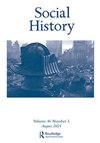Under the landlord’s thumb: municipalities and local elites in Sweden 1862–1900
IF 1.1
1区 历史学
Q1 HISTORY
引用次数: 1
Abstract
ABSTRACT The Swedish Municipality Act, issued in 1862, consolidated a plutocratic system in which ownership and income, and the resulting level of taxation, translated into political power. However, as a measure to hinder large landowners from holding a majority of the votes, the Act guaranteed voting rights for tenants. The aim of this article is to analyse how power relations played out after this challenge to landlords’ hegemony. Through an analysis of tenants’ contracts, appeals to the King in Council and minutes from municipal board meetings, we show how landlords did not trust a political culture of deference to secure power, even if they had demanded subservience in contracts. In a deliberate and specific way, they also reserved voting rights for themselves, which we find to have been a widespread pattern, although it was repeatedly pointed out as unlawful by the King in Council. However, through the analysis of the board meetings, it becomes clear that the position of manorial landlords in these municipalities was so obvious that they rarely had to confront their tenants with their illegitimate contractual restrictions. The results empirically challenge a narrative of slow but steady democratisation and theoretically challenge the alleged reciprocity of landlord–tenant relations.在地主的控制下:瑞典的市政当局和地方精英1862-1900
1862年颁布的《瑞典市政法》巩固了一种财阀制度,在这种制度下,所有权和收入以及由此产生的税收水平转化为政治权力。但是,作为阻止大地主拥有多数投票权的措施,该法案保障了佃户的投票权。本文的目的是分析在这场对地主霸权的挑战之后,权力关系是如何发挥作用的。通过对租户合同的分析,对国王议事会的上诉和市政委员会会议的记录,我们展示了房东如何不相信尊重的政治文化来确保权力,即使他们在合同中要求服从。他们还以慎重和具体的方式为自己保留投票权,我们发现这是一种普遍的模式,尽管国王御前会议一再指出这是非法的。然而,通过对董事会会议的分析,很明显,这些市政当局的庄园地主的地位是如此明显,以至于他们很少不得不面对他们的租户的非法合同限制。研究结果从经验上挑战了缓慢但稳定的民主化叙事,从理论上挑战了所谓的房东-房客关系的互惠性。
本文章由计算机程序翻译,如有差异,请以英文原文为准。
求助全文
约1分钟内获得全文
求助全文
来源期刊

Social History
HISTORY-
CiteScore
1.10
自引率
0.00%
发文量
37
期刊介绍:
For more than thirty years, Social History has published scholarly work of consistently high quality, without restrictions of period or geography. Social History is now minded to develop further the scope of the journal in content and to seek further experiment in terms of format. The editorial object remains unchanged - to enable discussion, to provoke argument, and to create space for criticism and scholarship. In recent years the content of Social History has expanded to include a good deal more European and American work as well as, increasingly, work from and about Africa, South Asia and Latin America.
 求助内容:
求助内容: 应助结果提醒方式:
应助结果提醒方式:


